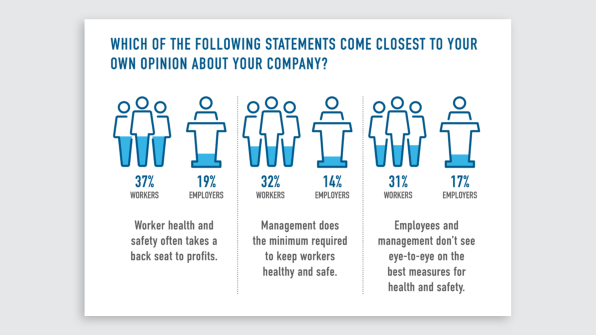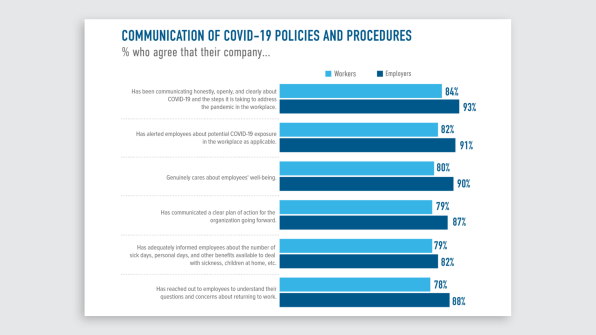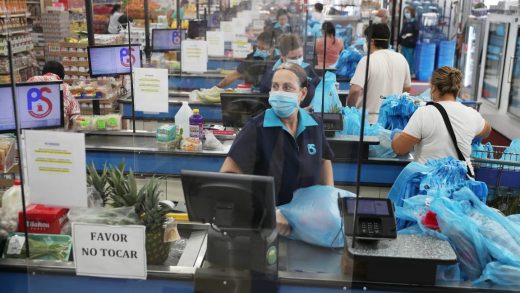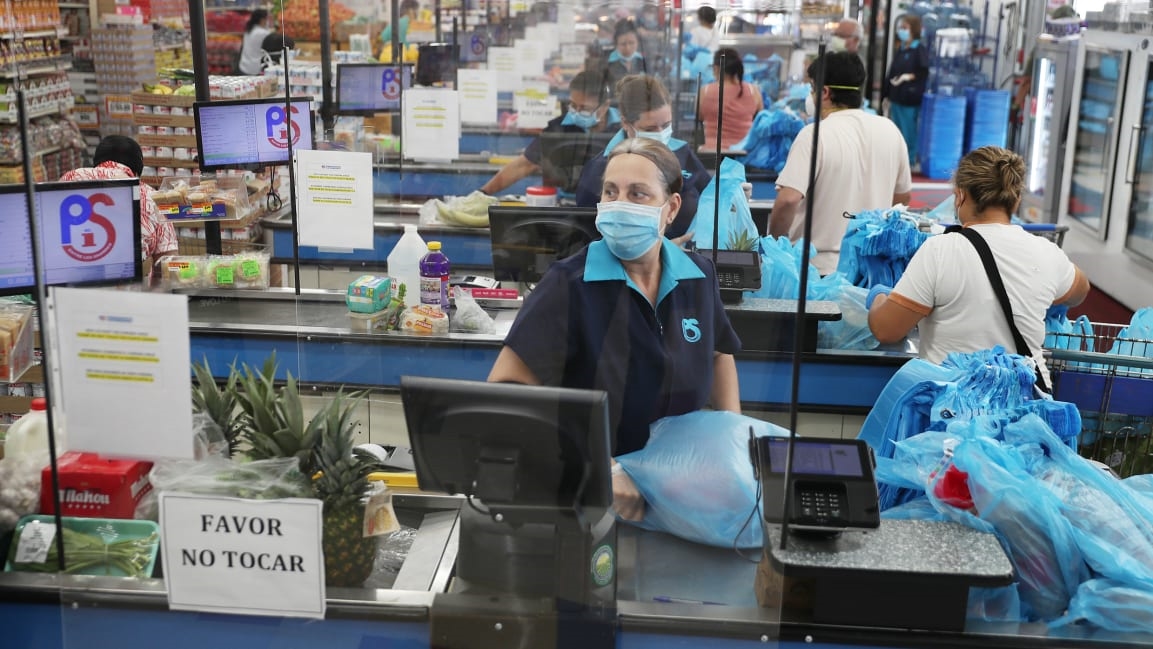Employers say they’re protecting essential workers from COVID-19. The workers disagree
At Just Capital and the Ford Foundation, we work to build a more inclusive, people-centered version of the American economy, so we teamed up with the Harris Poll to conduct a survey to understand the effectiveness of current COVID-19 workplace policies. We surveyed both employers and essential workers on how they view on-the-job safety today. We asked about the safety policies and procedures in place, assessed the level of compliance with these policies, evaluated their effectiveness, and looked to understand how workers were treated when they got sick, as well as trepidation around reporting.
It turns out there’s a stark disconnect between workers and employers. Workers report experiencing significantly lower levels of health and safety protections than employers report providing.

There is some good news: More than 70% of workers who are working out of the home report feeling safe on the job. But unfortunately, that means close to 30% percent of workers who are working outside their homes don’t feel safe, even nearly a year into the pandemic, when clear, science-based practices about how to minimize transmission risk are now widely understood. By contrast, 86% percent of managers think that they’re doing a good job by making health and safety a high priority.
And this disparity between workers and employers is even wider when it comes to workers of color and gig workers. Hispanic workers are two times more likely to say they have been discouraged from reporting sickness (28% versus 13% overall), and both Hispanic and Black workers are disproportionately more likely to say they fear negative, personal impact if they were to report on safety issues in the workplace.
Meanwhile, our poll reveals gig and temporary workers report the highest feelings of lack of safety as well as lack of support. More than half (57%) of gig and multiple-job holders say that either they or someone else in their organization was discouraged from reporting injury or sickness, versus 15% of single-job holders.
It’s clear there is misalignment between workers and companies over the state of workplace safety, indicating that a meaningful number of business leaders may be disconnected from the lived realities of their employees’ experiences on the job. Given the urgency of the health and safety issues frontline workers continue to face, business leaders should act immediately to strengthen workplace safety and ensure solutions are truly making a difference for their employees and, by extension, communities.
First, business leaders should adopt a bottom-up, people-centered approach to workplace health and safety. A company can have all the right policies on the books, but if they’re not fully and consistently implemented or if workers don’t feel empowered to flag breakdowns or suggest improvements to their managers, then this disconnect will persist and potentially cost lives. This is about creating mechanisms for and a culture that invites honest, two-way feedback among frontline workers and managers. Employers should keep in mind the findings that workers of color, part-time workers, and gig workers are the most reluctant to report concerns or suggest improvements due to fear of retribution or job loss.

Second, employers should think long-term when it comes to health and safety. This means upholding the policies that have worked in this pandemic even when it’s over, including paid sick leave, employee engagement, and higher pay for frontline workers, contracted employees, and temporary workers. Workers are an asset for companies—but they need the kind of protections and pay that will allow them to do their jobs effectively and safely.
Nearly 60% of workers surveyed say their companies provided dedicated paid leave to employees in quarantine, with the lowest incidences among small businesses and retail. And a majority of employers note they have separate health and safety policies for their fully employed workforce versus part-time, temporary, or freelance workers. These findings point not only to a fundamental business issue to address, but also a major public health vulnerability of national concern.
If workplace health and safety is a litmus test of the morality of an economy, then this survey suggests that we have a lot of room for improvement. And it is not only a moral issue; it’s also directly tied to public health outcomes, long-term equity issues, and business performance.
As we enter what is hopefully the final stage of this deadly pandemic, we must ensure our nation’s businesses deliver value and innovation without putting working people in harm’s way. That means not only embracing the right set of policies, such as paid sick days, but also ensuring those policies actually match lived experiences. This is possible only when companies fully embrace workers as partners in the process of improving workplace health and safety and invite them to have a voice in designing, implementing, and improving solutions. Only then can companies, and the country, build long-term resilience and the people-centered economy we all need and deserve.
Alison Omens is the chief strategy officer at Just Capital. Rachel Korberg is a program officer with the Ford Foundation’s Future of Work(ers) initiative.
(45)



